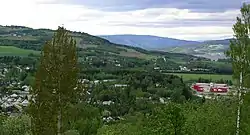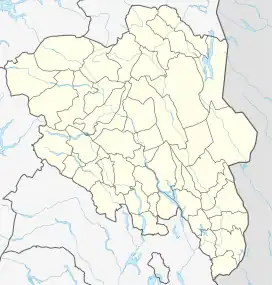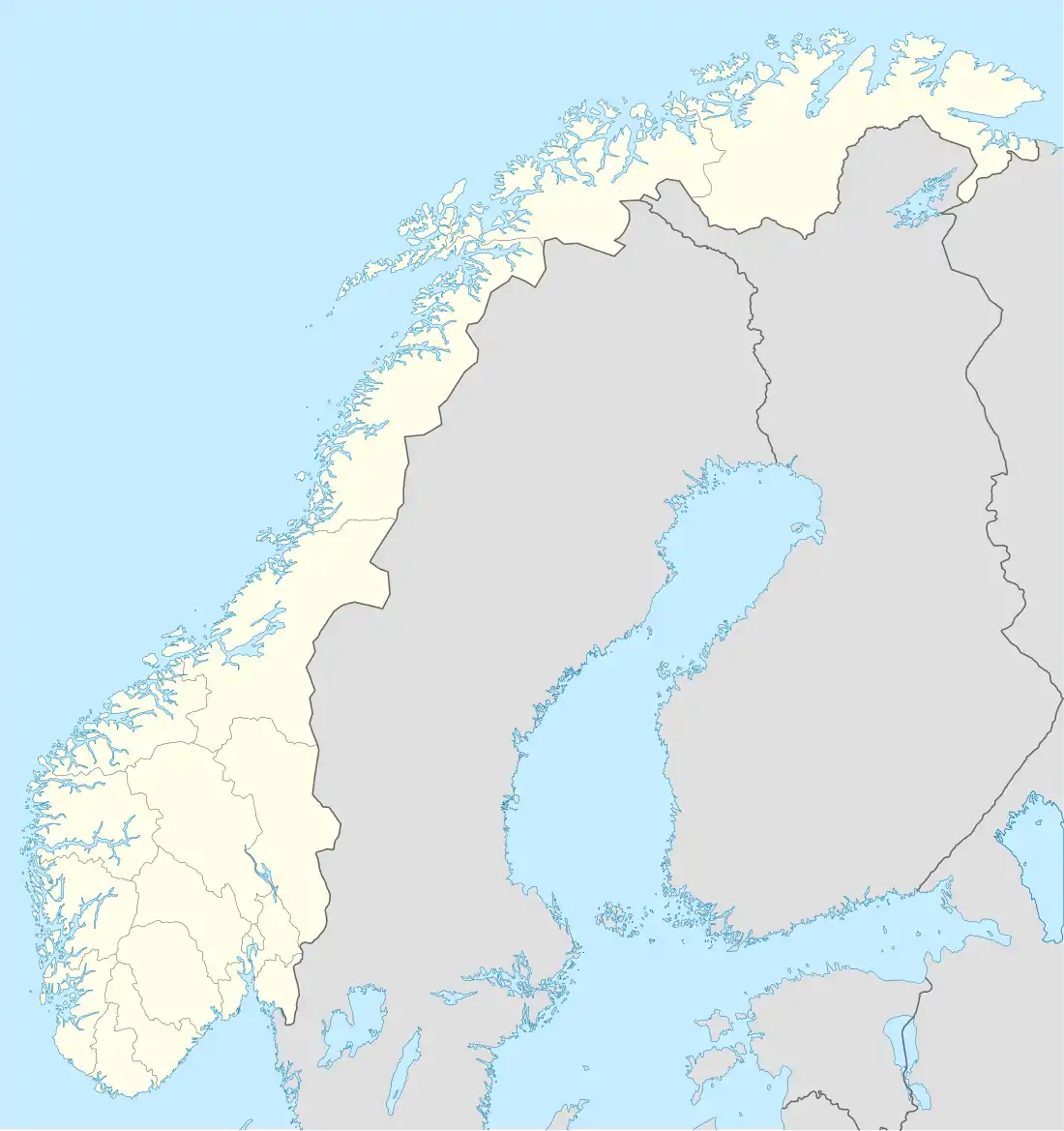Biri, Norway
Biri is a village in Gjøvik Municipality in Innlandet county, Norway. The village is located along the western shore of the lake Mjøsa, about 20 kilometres (12 mi) north of the town of Gjøvik. The Norwegian National Road 4 highway runs through the village which is near the Mjøsa Bridge about halfway between the towns of Lillehammer and Gjøvik. The 2.03-square-kilometre (500-acre) village has a population (2021) of 1,495 and a population density of 738 inhabitants per square kilometre (1,910/sq mi).[1][3]
Biri | |
|---|---|
Village | |
 View of the village | |
 Biri Location of the village  Biri Biri (Norway) | |
| Coordinates: 60.95558°N 10.6115°E | |
| Country | Norway |
| Region | Eastern Norway |
| County | Innlandet |
| District | Vestoppland |
| Municipality | Gjøvik Municipality |
| Area | |
| • Total | 2.03 km2 (0.78 sq mi) |
| Elevation | 145 m (476 ft) |
| Population (2021)[1] | |
| • Total | 1,495 |
| • Density | 738/km2 (1,910/sq mi) |
| Time zone | UTC+01:00 (CET) |
| • Summer (DST) | UTC+02:00 (CEST) |
| Post Code | 2836 Biri |
History
The village of Biri was the administrative centre of the old Biri Municipality which existed from 1838 until 1964 when it was merged into Gjøvik Municipality. The village of Biri has been the commercial centre of the surrounding countryside for a long time. The area has traditionally been centred around agriculture and forestry.
Biri Church is a cruciform church in Biria dating back to 1777. Built of timber, it has 450 seats. The church was erected after the original church burned down. In 1890 there was another major fire, this time at the Biri parsonage. The fire also destroyed church records for 1789-1814 and 1854–1877. In April 2007, major damage in the church led to an extensive rehabilitation.
Biri Glassworks produced glass, windows, and bottles. Production started in 1764 after it was created by Royal Norwegian charter. The operation went bankrupt in 1843 but was rebuilt in 1855. In the 1880s, it was closed.[4]
Madshus is a Norwegian ski and ski-equipment manufacturer which is located at Biri. The first Madshus skis were produced by Martin Madshus in 1906 in a barn in Vardal. The company was moved to Lillehammer in 1936, and then to Biri in 1972.[5]
Name
The village is named "Biri" after the old Biri farm (Old Norse: Biríð) since the first Biri Church was located there. The name is presumably very old, and the meaning is unknown. One possibility is that the Old Norse name came from berhíð which means "bear den".[6][7]
Notable residents
- Torbjørn Løkken, a nordic combined skier
- Gunnar Kalrasten, a parliamentary representative for the Norwegian Labour Party
References
- Statistisk sentralbyrå (1 January 2021). "Urban settlements. Population and area, by municipality".
- "Biri, Gjøvik". yr.no. Retrieved 5 November 2022.
- Thorsnæs, Geir, ed. (29 March 2022). "Biri". Store norske leksikon (in Norwegian). Kunnskapsforlaget. Retrieved 3 November 2022.
- "Biri Glassverk" (in Norwegian). Ekstraskatt for Biri Glasfabriqu. Archived from the original on 15 March 2012.
- "About Madshus". Madshus.
- Rygh, Oluf (1900). Norske gaardnavne: Kristians amt (in Norwegian) (4 ed.). Kristiania, Norge: W. C. Fabritius & sønners bogtrikkeri. p. 2.
- Mæhlum, Lars, ed. (21 January 2020). "Biri (tidligere kommune)". Store norske leksikon (in Norwegian). Kunnskapsforlaget. Retrieved 3 November 2022.
External links
 Media related to Biri (Gjøvik) at Wikimedia Commons
Media related to Biri (Gjøvik) at Wikimedia Commons